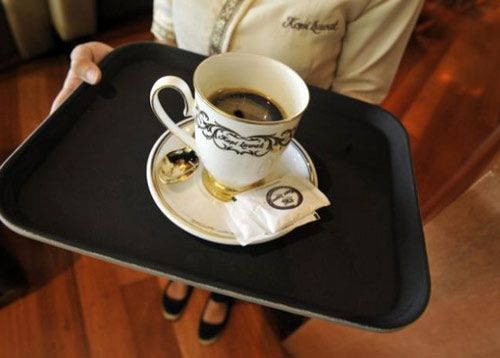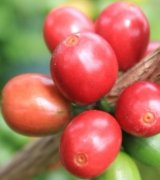Reveal the secret that the top Kopi Luwak civet only chooses good beans to eat.

According to the Central News Agency, one of the main producers of civet coffee, known as "the most expensive coffee in the world," is Indonesia, while in Europe and the United States, civet beans can even be sold for as much as $800 per kilogram. This coffee bean can produce top coffee with a price of up to $80 per cup. Lin Yijun, who bakes civet coffee beans in Indonesia, said, "civets don't eat all kinds of coffee beans. They only pick good beans." The civet is equivalent to helping people pick coffee beans first, and the roasted coffee is sweet in the mouth, leaving fragrance in the lips and teeth.
Cat shit Coffee is popular
It is reported that "Luwak" is commonly known as "civet coffee" in Indonesia. Musk cats are omnivores, living in tropical rain forests, subtropical evergreen broad-leaved forests or hills and mountains below 2000 meters above sea level. A survey pointed out that there are about 50 tons of civet coffee in the coffee market every year, all from Indonesia, Vietnam, the Philippines and China.
How exactly is civet coffee made? The coffee fruit passes through the civet's digestive system, only the pulp of the fruit appearance is digested, and the coffee beans are excreted intact. It is reported that this digestion process will destroy the protein in coffee beans, reduce the bitter taste of coffee, so that the taste of coffee will become more rich and round, mellow and sweet.
In general, coffee is made by washing or insolating, removing the peel, pulp and sheepskin of coffee, and finally taking out coffee beans. But civet coffee uses the process of natural fermentation in animals to obtain coffee beans. Coupled with the fact that civets only exist in islands such as Indonesian islands, the time and place of infestation is mysterious, and the number is decreasing, which leads to the high price of civet coffee.
There is knowledge in feeding and eating beans
However, the report points out that it is also learned to feed civets to eat coffee beans. Lin Yijun, who has been baking civets' coffee beans in Indonesia for many years, says that when feeding civets, coffee beans should not be fed every day, otherwise civets will have diarrhea. Coffee beans are only part of the civet's main meal. It is also necessary to feed it bananas, pineapples, fruits, chicken and other foods, so that civets' intestinal enzymes are richer.
In fact, gentle civets don't eat all coffee beans, she says. They choose the most ripe, sweet, full and juicy coffee beans as food. "civet cats are better than machines," she said, which is equivalent to helping people choose coffee beans once.
When it comes to tasting musk cat coffee, laymen should not think that "money is an uncle". Lin Yi-Jun says, "people who like to drink coffee with sugar and milk should not drink civet coffee." the essence of civet coffee is "taste sweet". Even if it goes into the throat for a period of time, there will still be the aroma of caramel and chocolate in the mouth, which is very different from coffee with sugar and milk.
She said that some guests drink civet coffee before going to taste the wine, because the mouth is still sweet, the age of the wine seems to have increased from 12 years to 18 years.
The market is too good to cause controversy over animal cruelty.
Although civet coffee makes glutton's lips and teeth fragrant, a recent BBC survey pointed out that some of the civets that appear on the market are advertised as "wild civets," but in fact it is Indonesian operators who keep civets in lattice cages, which is suspected of animal abuse.
Teguh Pribadi, founder of the Indonesian civet coffee association, insists that the mislabelled Indonesian civet coffee from wild civets is not common and may be an isolated case.
Lin Yijun, who once kept civets in captivity, believes that farmers and civets are symbiotic with each other, and civets are their source of income. If they abuse money-making tools and civets have poor health, the quality of coffee beans produced will certainly be poor, and farmers' income will be affected.
She said that captive farming makes it convenient for farmers to harvest coffee beans regularly, and most of the captive grounds are natural spaces where civets can move freely, while coffee beans excreted by wild civets often take time to find, and when farmers find them, the coffee beans have been overfermented and the quality is not good.
In addition, due to the scarcity and high price of civet coffee, there is news that "fakes are full" from time to time. Indonesian media recently reported that there is a cat similar to a civet in Indonesia, called "Musang" in Indonesia. Because it is cheaper and eats more than civets, it is often bought and fed by coffee makers, and then mixed with discharged coffee beans as civet coffee to sell.
Lin Yijun called on consumers to look clearly at the origin, ingredients and other matters when choosing and buying civet coffee. If there is only the bitter taste of ordinary coffee, but not the mellow and sweet taste of musk cat coffee, that is to buy "fake civet coffee" with fish eyes mixed with pearls.
Important Notice :
前街咖啡 FrontStreet Coffee has moved to new addredd:
FrontStreet Coffee Address: 315,Donghua East Road,GuangZhou
Tel:020 38364473
- Prev

The bitter taste of Manning coffee on the outside
Candy, which prefers heavy flavors, has a special preference for extra-bitter coffee. Fancy coffee in an ordinary coffee shop usually doesn't satisfy her, but whenever there are conditions, she will order a single cup (coffee made with a kind of coffee bean powder, no milk or sugar), and Manning suits her best. This kind of coffee from Indonesia has the temperament of Asian coffee beans. It is extremely bitter and strong.
- Next

Yunnan Coffee from the outside: coffee Plantation in Yunnan
People living in modern cities are no stranger to the word coffee, and its inherent form is so deeply rooted in the hearts of the people: black slightly bitter liquid is filled in porcelain cups, and coffee fans drink its acid and taste its bitterness. even the mood has become an indispensable culture of coffee. Undeniably, I like coffee very much, too. By chance, I met a coffee grower.
Related
- Detailed explanation of Jadeite planting Land in Panamanian Jadeite Manor introduction to the grading system of Jadeite competitive bidding, Red bid, Green bid and Rose Summer
- Story of Coffee planting in Brenka region of Costa Rica Stonehenge Manor anaerobic heavy honey treatment of flavor mouth
- What's on the barrel of Blue Mountain Coffee beans?
- Can American coffee also pull flowers? How to use hot American style to pull out a good-looking pattern?
- Can you make a cold extract with coffee beans? What is the right proportion for cold-extracted coffee formula?
- Indonesian PWN Gold Mandrine Coffee Origin Features Flavor How to Chong? Mandolin coffee is American.
- A brief introduction to the flavor characteristics of Brazilian yellow bourbon coffee beans
- What is the effect of different water quality on the flavor of cold-extracted coffee? What kind of water is best for brewing coffee?
- Why do you think of Rose Summer whenever you mention Panamanian coffee?
- Introduction to the characteristics of authentic blue mountain coffee bean producing areas? What is the CIB Coffee Authority in Jamaica?

